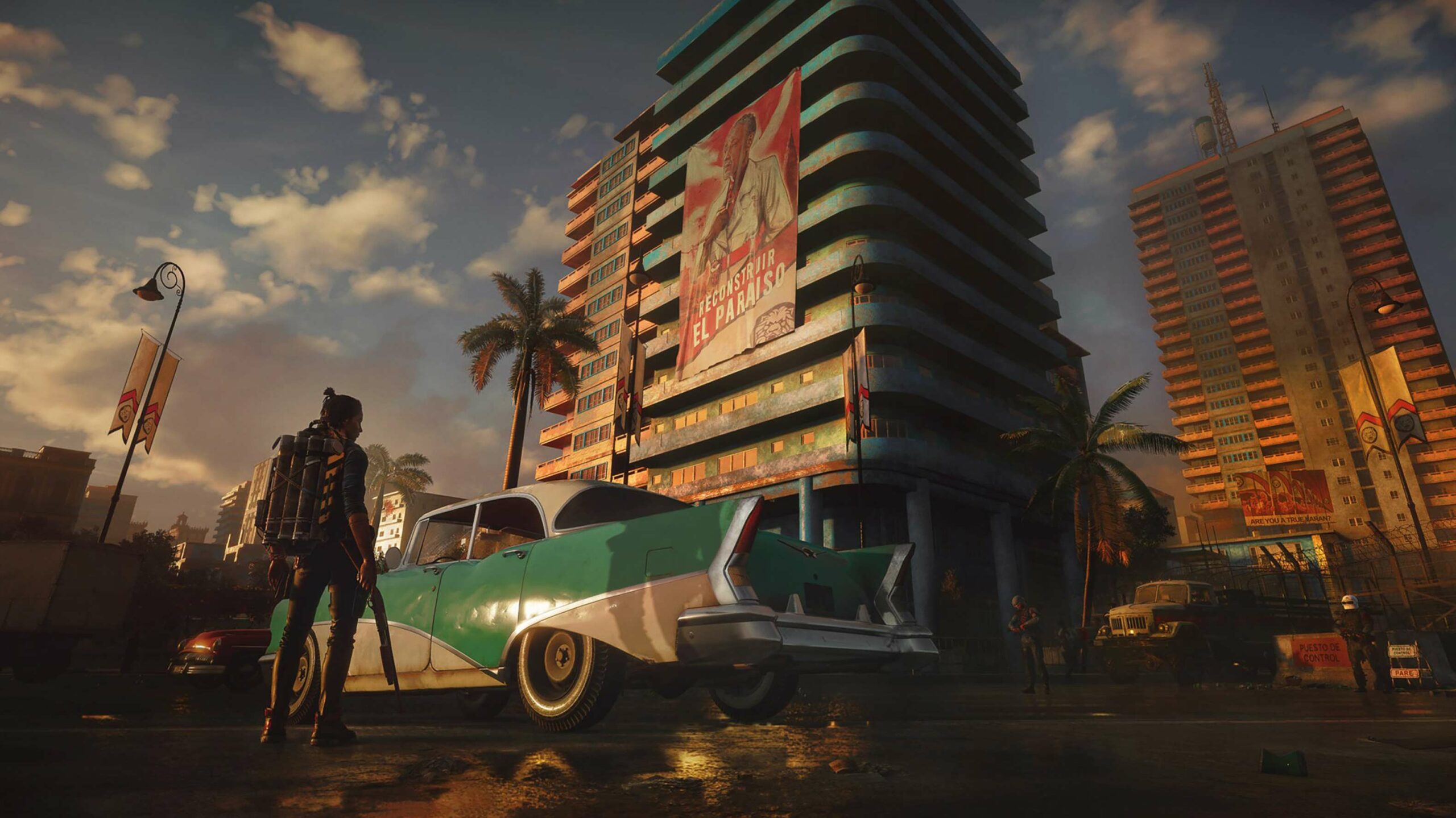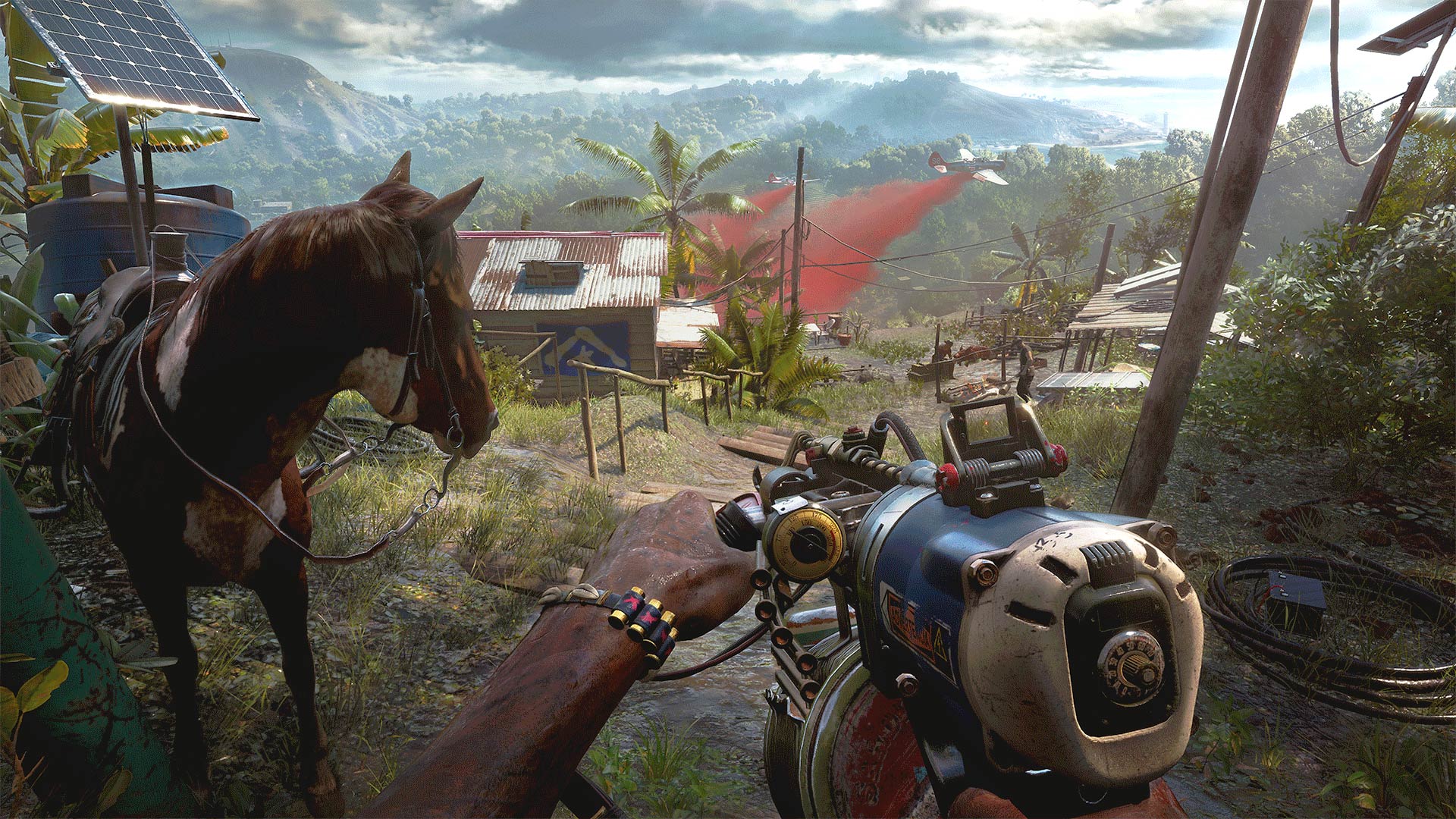
It’s been a big couple of months for Stephanie Brenham.
In October, she and the rest of her team at Ubisoft Toronto finally released Far Cry 6 after a five-year, COVID-prolonged development cycle. And earlier this month, she was inducted into The Game Awards’ second-ever “Future Class,” a global group of 50 gaming industry members who “represent the bright, bold and inclusive future of video games.”
Notably, Brenham was selected out of 3,000 nominees for her leadership roles in both programming and diversity and inclusion initiatives.
👏Congratulations to @StephsTangents on being named to #TheGameAwards Future Class 2021!
🎖A programmer, mentor & volunteer, she was recognized for her career excellence & contributions to the dev community and D&I.
👉Check out all 50 inspiring winners: https://t.co/KJPLwCYcRQ pic.twitter.com/1Vg3jW8Ju8
— Ubisoft Toronto (@UbisoftToronto) December 7, 2021
“I’m blown away,” Brenham admits. “The way that people have really responded to me being nominated, that they’ve said, ‘I couldn’t think of anyone better for this,’ has been tremendously moving.”
These accomplishments are especially noteworthy considering they come during Brenham’s second time in the world of programming, following a family-related pause.
“I came into programming in second-year university [in the ’90s], and so I kind of got into it. Society had already kind of built up this expectation of what a programmer is, and so I really did encounter that sort of, ‘Oh, you haven’t been coding since you were 13? Well, my cousin has, so I don’t know how that’s gonna go for you.’ And it’s like, ‘I’m getting A’s at U of T [University of Toronto]. I think it’ll be fine.'”
She went on to work as a technical lead at Toronto-based Alias on its Academy Award-winning software, Autodesk Maya, for a number of years. Brenham says this was a great experience, but one that had to be put on hold to look after her kids. Six years later, however, she got to re-enter the field in 2016 — this time at Ubisoft Toronto, where she’s since worked her way up to 3D Team Lead Programmer.
What is raytracing and what does it do? Discover how art and tech meet to bring our worlds to life! pic.twitter.com/QM0FQO1PPm
— Ubisoft (@Ubisoft) December 17, 2021
While that might sound like a difficult and hectic period, Brenham says the experience proved invaluable.
“I got to come back in the internet age — that wasn’t a thing in the ’90s in the same way that it is now, and how much you get to look online and see resources. Of course, it is a challenge, because with everything being so accessible, how do you pick out the good sources? [But] I [was] very lucky with [being] already connected with people who are still programmers, so they can give you tips on areas to look [at].”
Although she was fortunate to have that help, she notes that not everyone was as supportive.
“There is a challenge to coming back after being at home. I had one person even ask me, ‘so do you really think you’re going to be ready?’ And I’m like, ‘well, it’s like being a parent — are you ever really ready to become a parent?’ If you don’t 100 percent become ready, you just gotta go in. You’ve got to get yourself up to date and be ready to learn on your feet. It’s been like feeding from the firehose of information both times — I love it.”
The making of Far Cry 6
In the lead-up to Far Cry 6, much of the marketing focus was placed on Emmy Award-winning actor Giancarlo Esposito, the Breaking Bad and Better Call Saul star who plays the game’s villain, Antón Castillo. But Esposito’s performance would mean little if it weren’t supported by the visuals and Cuba-inspired setting of the game that Brenham’s team meticulously helped to create.
As she explains it, her job on Far Cry 6 meant being “responsible for the visual systems fidelity” and staying “true to the art vision and also the performance, making sure that we get that interactivity” for the player.
A big part of that, she says, was the game’s “brand-new, dynamic” weather system.
“It adds to the immersion, but it’s also tying into the gameplay. With the storms that roll in, you get the humid feel of a tropical island, the GPU particles are brand new, so we can still meet those performance numbers. The clouds volumetric with the lightning, the sunsets that you get to see on that ocean vista… All of these things make it an interactive world that’s part of the gameplay because the rain dissipates the fire, the wind blows away the poison… All of this makes the world alive for our players when they go in. Everyone’s getting their own experience, and we really get to be a part of so many of the different areas of the game.”
All told, Brenham says she’s “tremendously proud” of the 3D team’s work, which extends to a fine attention to detail that many players might initially overlook.
“It goes down to tweaking the wetness for each of the materials, because the way gunmetal looks wet is very different than the bark of a tree, or the leaves, to the porosity of the surfaces. These puddles don’t magically pop in and out — they are forming and drying, as they would in simulating the physical behavior in the world,” says Brenham.
That said, she notes that some people have actually picked up on this, and it makes all the difference for her and the team.
“What’s so rewarding is when people notice these details! I loved when one fan posted a capture of a 24-hour cycle in the game of a puddle forming and drying. Yes, yes!” she says with a laugh. “So [what’s] most rewarding is seeing what people find and notice in this game, because in the end, you know you’re never creating a perfect game — the perfect game does not exist — but what you’re hoping is you’re getting a little bit of magic in it to make it meaningful and fun and exciting experience for people. And so when you see that catch fire with the players, you’re like, ‘yes!’
All the while, the team had to develop the game for a staggering number of platforms spanning last-gen and new-gen hardware, which meant reaching 4K/60fps on both the latter and PC. That was an especially difficult task amid the pandemic, she notes.
“It was a real challenge because for my team, in particular, we need direct access to the hardware. You can’t just simulate these things — you need to be playing on the systems themselves, with the exact restrictions that the players are going to be facing. So it was a real challenge in terms of, ‘well, if we can’t bring the people to the hardware in the traditional fashion of coming to the office, we need to, in many cases, be bringing the hardware to the people and to their homes.’ And finding new ways in order to get that working with our infrastructure.”
On top of that, Brenham says COVID had more understated impacts that you might not even initially consider.
“[I had to be] mindful as a team lead that no longer are people just going to be able to casually ask you questions because you happen to be walking by or you’re sitting right beside them,” she says. “It’s making that effort to make yourself be approachable to people — we had people join and switch teams, and so they might not have even met me. So [I would do] things like always keep my camera on so people see that I’m smiling. I’m not problem-focused — I’m focused on ‘okay, let’s make this better, let’s move forward.'”
Shedding more light on the personal sides of game development
Video game companies are notoriously secretive compared to the likes of the movie or TV industries. While it’s not uncommon to get extensive documentaries or other features on a film or series, we don’t often get to see how the sausage gets made when it comes to games.
That’s why it was particularly notable when gTV released Revolución: A Far Cry Story, a 38-minute documentary following Ubisoft Toronto’s work on Far Cry 6 both before and during the pandemic. For viewers, it provided a rare look not only at some of the many challenges that studios faced, but the deeply personal stories of their individual developers.
Perhaps the most moving anecdote in the documentary from the Ubisoft Toronto team was from Brenham herself. As she explains in the film, her late mother was from Columbia, and she had told her stories about the “El Bogotazo” revolution in her home country. Given that Far Cry 6 was itself centred around the toppling of a dictator and his regime, Brenham said her work on the game became her “love letter” to her mother.
Now that both Far Cry 6 and the documentary have been released, Brenham says she’s happy to be able to really speak to the process of making the game.
“My mother was from Colombia. She never met a fight she didn’t pick. She was a revolutionary… This game was my love letter to her.” 💌
For our team, #FarCry6 is more than just a game. Discover the personal stories that shaped it 👉 https://t.co/8AIMgJUsr2 pic.twitter.com/IY2CWnF90V
— Ubisoft Toronto (@UbisoftToronto) November 30, 2021
“It’s really great to be able to speak about some of our experiences. We spend so long not being able to tell our family what we’re doing, and you want to, particularly when it’s such a personal connection, in my case.”
But beyond allowing players to put faces to some of the people who make the games they enjoy, Brenham says documentaries like Revolución also help the developers learn more about one another.
“This was a real opportunity from the team’s perspective to also get to see some of the experiences from other areas of the game because it’s a big game. I mentioned that I miss the cross-pollination that kind of happens in the office where you just happen to be in the kitchen when the audio people are there. And so you’re hearing about what audio is doing [in the documentary]. You can’t have those kinds of casual interactions [remotely],” she says.
“So in many ways, it was getting to see into a writer’s room, for example, for the first time. That’s been one of the most rewarding things for me about being on this game — being able to hear from people who are working on areas that I could never contribute to. I mean, there are reasons why no one pays me to write stories,” says Brenham, laughing.
Creating a more inclusive workplace
Outside of her programming work, Brenham also regularly speaks to schools, mentors interns and students, and serves as one of the leaders of Ubisoft Toronto’s Women Employee Resource Group.
In more ways than one, she plays an important role at the studio, especially considering its history. Last year, reports surfaced out of multiple Ubisoft studios, including Toronto, regarding major workplace misconduct, particularly towards women. In a June 26th, 2020 letter addressed to management, more than 100 Ubisoft Toronto employees expressed “grave concerns about ongoing reported harassment and an inability to feel safe or protected within our own studio.”
While certain key alleged offenders have since departed the company, some developers are still reportedly unsatisfied with how Ubisoft at large has responded to the allegations. Meanwhile, other major publishers, especially Activision Blizzard, have been reckoning with their own allegedly toxic “frat boy” cultures.
When asked what must be done for Ubisoft and other companies to meaningfully address these concerns, Brenham provided a few suggestions.
“Representation, that’s a gimme. But also, I feel that diversity is a lot of outreach as well. There’s the mentorship that I make reference to — there is also looking at the ways that we are presenting ourselves publicly,” she begins.
“And also internally, I’m tremendously proud of some of the initiatives happening in Ubisoft from very open conversations, since those [allegations] have come out, about improving leadership. That we are humans — that we are simply coming in from outside, and the more that we can improve.”
She adds that it “often” boils down to “the soft skills and our ability as leaders to make a welcoming space” for people.
“To be able to understand that we all have different perspectives, and it could be that you’re coming in from having taken care of three kids, or it could be that you’re coming in from a different background that I don’t necessarily understand. And so having those tools to deal with those different circumstances, or people in this workplace, is a part of breaking down those barriers.”
For her part, she says she volunteers on outreach-related opportunities “as much as possible” on “at least a monthly basis,” if not more frequently.
“If there’s a request going out for a speaker or a mentor or an opportunity to reach out into the community, I try to always say ‘yes,’ because I feel like representation is so very important. There’s not a lot of other people who can provide female representation from a programming perspective in games.”
Given that she’s often speaking with people outside of the industry about her work, she adds that one of the common misconceptions about game development revolves around people thinking they have to be “majorly hardcore” players. This is untrue, according to Brenham.
“There are so many different styles of being a gamer. You can be a completist and that means that you’re only going to play like maybe one or two games a year, if you’re putting hundreds of hours into each game, versus somebody who is going through and chewing these games like they’re candy because they’re going on to the next exciting experience. And those are all perfectly valid experiences. And so [it’s] being able to speak to the variety of gaming, and the joy of working with people who are kind of naturally playful,” she says with a laugh.
This list was curated from nearly 3,000 applicants around the world. Thanks to @emily_bouchoc and @WolfeDente for an incredible job leading this initiative for us!
— Geoff Keighley (@geoffkeighley) December 6, 2021
From her experience, she says being in the industry has brought her into contact with “people who are tremendously smart, who are experts in their field, and so very approachable” whenever support is needed.
This is something she says looking to continue to expand in the coming months. Currently, she’s preparing for the C++ North software developer conference with Guy Davidson from Creative Assembly (Total War). “This is a really great way to, especially with the pandemic, really kind of rally people again — get the spirit up,” she teases. “And so I’m really looking forward to that.”
Beyond that, she says she’s looking forward to engaging with her fellow Future Class members.
“The most exciting thing for me [with Future Class] is actually finding out that we get to be on a Discord server and get to know the other people in the Class. Because there are so many other perspectives I cannot speak from, or speak to, with knowledge,” she explains.
“And so to have an opportunity to get to know these people means that I’m going to be able to do more. There’s nothing that would make me prouder than to make this a better place.”
This is the latest entry in our monthly Canadian developer interview series. Last month’s feature, focused on Square Enix Montreal head Patrick Naud, can be found here.
Image credit: Ubisoft
MobileSyrup may earn a commission from purchases made via our links, which helps fund the journalism we provide free on our website. These links do not influence our editorial content. Support us here.




